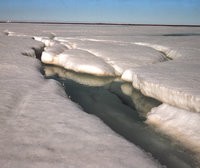In January, when a U.S. Coast Guard icebreaker escorted a Russian tanker carrying essential fuel to Nome, Alaska, it served as a reminder that the U.S. and Russia have many reasons to continue pursuing a thaw in relations. Unfortunately, beyond the New START agreement and a few other deals, the U.S.-Russia reset, which was announced with fanfare in 2009, seems to have descended into bureaucratic obscurity. While it is essential that the United States maintains a constructive relationship with the Russian federal government, there is much more to be gained in developing working relationships that extend to regional governments, nongovernmental organizations and indigenous people as well, in order to address cooperation not just in security affairs but also in economics, trade, science and environmental conservation.
Two expert assessments of the limitations of the reset are particularly insightful. In December 2010, Deana Arsenian and Andrey Kortunov noted here in World Politics Review that while New START represented a major accomplishment, the reset had so far failed to lay the foundation of a durable relationship that reached deeply into the two societies. A year later, former Russian Foreign Minister Igor Ivanov blamed the entrenched geopolitical mindset of the political intelligentsia in both capitals for protecting status quo views left over from the Cold War and creating a barrier to greater implementation of the reset.
Building a better, more effective relationship with Russia is too important to allow ties to be derailed by changes of leadership in both capitals. Unfortunately, a new approach at the highest levels of government may not be possible given election year politics in Washington and Moscow, and certainly not when the reset is focused principally on presidents, prime ministers and Cabinet members.

